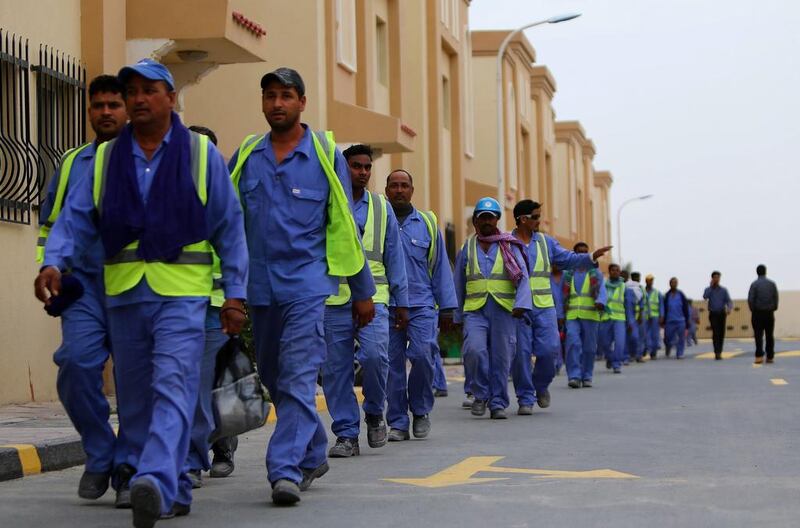ABU DHABI // A new labour law implemented in Qatar on Tuesday will “barely scratch the surface” of reforming the controversial kafala system, rights groups said.
“This new law may get rid of the word ‘sponsorship’ but it leaves the same basic system intact,” Amnesty International said.
Human Rights Watch said the changes left the “fundamentally exploitative characteristics of the kafala system in place”.
However, officials in Doha urged patience while the new rules take effect. “We urge the international community not to draw any definitive conclusions until there has been time to see the new law in action,” said labour minister Issa bin Saad Al Jafali Al Nuaimi.
He described the law as “a modernised, contract-based system that safeguards workers’ rights and increases job flexibility”.
Under the previous law, foreign workers were required to obtain their sponsor’s permission to leave the country or change jobs, which allowed for the exploitation of labourers and was at the core of criticism of Qatar’s labour practices.
Under the new law, foreign workers must still obtain their employer’s permission to travel abroad, but the interior ministry has created “grievance panels” to adjudicate disputes if a worker is not allowed to leave.
The panels, which began hearing complaints on Tuesday, will ask employers to justify why an exit permit was not given, and will rule within three working days of receiving a complaint. Valid justifications for denying exit include fraud or attempts to avoid criminal prosecution. If the employer does not respond, the worker will be allowed to travel.
The new law also allows workers on fixed-term contracts to change jobs without the approval of their employer once their contract is finished. It does not, however, allow workers on open-ended contracts to change employers without permission. Workers on such contracts must wait five years to change employment unless the employer provides a no-objection certificate.
The law also imposes a fine of up to 25,000 Qatari riyals (Dh25,220) on employers who confiscate workers’ passports, up from 10,000 riyals under the previous law.
International labour unions and rights groups say the new law does not go far enough to protect, in particular, South Asian manual and semi-skilled labourers who have been hired to build billions of dollars of infrastructure projects related to World Cup 2022, which Qatar is hosting.
“I think the [new] law leaves many of the obstacles to a freer labour market in place and only makes some flexibility for potential foreign investors,” said Karen Young, a political economist at the Arab Gulf States Institute in Washington.
“Most foreign workers in Qatar will not see any real improvement in terms of mobility between jobs, or freedom to exit,” she said.
There are 2.1 million migrant labourers in Qatar from countries including Nepal, Bangladesh and India. The ministry of administrative development, labour and social affairs said Qatar flew home 10,000 workers who were victims of labour abuse in 2015.
However, the most common complaints by lower-wage workers are not about whether they can change jobs. Some say they are not paid the wages promised them in their contracts, or that they did not understand their contracts as told to them by middlemen in their home countries. Officials in Doha said the new law, “combined with ongoing enforcement and a commitment to systemic reform, not just in Qatar but also in countries of origin, will ensure workers’ rights are respected across the entire labour pathway”.
tkhan@thenational.ae
* Additional reporting by Agence France-Presse





